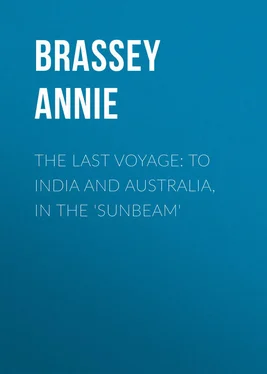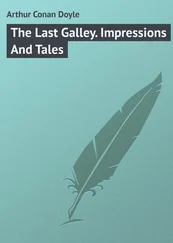Annie Brassey - The Last Voyage - To India and Australia, in the 'Sunbeam'
Здесь есть возможность читать онлайн «Annie Brassey - The Last Voyage - To India and Australia, in the 'Sunbeam'» — ознакомительный отрывок электронной книги совершенно бесплатно, а после прочтения отрывка купить полную версию. В некоторых случаях можно слушать аудио, скачать через торрент в формате fb2 и присутствует краткое содержание. ISBN: , Издательство: Иностранный паблик, Жанр: foreign_antique, foreign_prose, на английском языке. Описание произведения, (предисловие) а так же отзывы посетителей доступны на портале библиотеки ЛибКат.
- Название:The Last Voyage: To India and Australia, in the 'Sunbeam'
- Автор:
- Издательство:Иностранный паблик
- Жанр:
- Год:неизвестен
- ISBN:http://www.gutenberg.org/ebooks/29778
- Рейтинг книги:3 / 5. Голосов: 1
-
Избранное:Добавить в избранное
- Отзывы:
-
Ваша оценка:
- 60
- 1
- 2
- 3
- 4
- 5
The Last Voyage: To India and Australia, in the 'Sunbeam': краткое содержание, описание и аннотация
Предлагаем к чтению аннотацию, описание, краткое содержание или предисловие (зависит от того, что написал сам автор книги «The Last Voyage: To India and Australia, in the 'Sunbeam'»). Если вы не нашли необходимую информацию о книге — напишите в комментариях, мы постараемся отыскать её.
The Last Voyage: To India and Australia, in the 'Sunbeam' — читать онлайн ознакомительный отрывок
Ниже представлен текст книги, разбитый по страницам. Система сохранения места последней прочитанной страницы, позволяет с удобством читать онлайн бесплатно книгу «The Last Voyage: To India and Australia, in the 'Sunbeam'», без необходимости каждый раз заново искать на чём Вы остановились. Поставьте закладку, и сможете в любой момент перейти на страницу, на которой закончили чтение.
Интервал:
Закладка:
From the entrance-hall, marble corridors, from which hung handsome glass chandeliers, led into the centre room of a fine suite of apartments, where the Nizam shortly afterwards joined us. At breakfast I sat between his Highness and his chief aide-de-camp, neither of whom touched anything, except a glass of iced water and a cup of tea, during the whole of a very long meal. Subsequently the Nizam kindly caused all his best horses and ponies to be brought to the foot of the marble steps for us to see. There were Arabs of high degree, thoroughbred English horses, and very good-looking Walers among them, besides some tiny ponies, four of which, when harnessed together, drew a real Cinderella coach of solid silver. Although I delighted in looking at these beautiful animals, I became so tired that I had to make my escape. Some of the party stayed and went through the stables, harness-rooms, and coach-houses, which must, from their account, have been well worth seeing. They were especially struck by the perfect training of the horses, who seemed as docile as kittens, and would jump in and out of their stalls, take a straw out of their groom's mouth, and when told to 'go' would dash off wildly round the garden (to the great detriment of the flowers and plants), returning instantly to their stables at the word of command.
From the Nizam's palace I drove to see the wife of the Finance Minister, Mehdi Ali – an intelligent lady, who speaks English wonderfully well; in fact, she expressed herself so perfectly that it was difficult to believe she had scarcely spoken a word of our language for more than a year and a half. It seemed sad to hear that she never went out, because she did not care to go 'covered up,' and that such had been the seclusion of her existence, that she scarcely knew any animals by sight, except from pictures, and had no pets, except, as she said, 'pet books.' She showed me the books gained as prizes at college by her two nephews, with evident appreciation of their contents, one being Prescott's 'History of America,' and the other a translation of Homer's 'Iliad.' I parted with her after receiving the usual garland of honour on leaving, feeling grateful that Providence had not placed me behind a purdah, but had allowed me to go about and see the world for myself instead of having to look at it through other people's eyes.
The midday heat was so great that we gladly rested at the Residency until it became time to go to tea with Khurseed Jah, whose house is only a little distance off. We were received at the entrance to the garden by our host and his son, who led us to a marble platform by the side of a tank on which three boats were floating. One of these had the name of 'Sunbeam' painted upon it; but the compliment must have been paid some time ago, for both boat and paint looked decidedly shabby. On a marble platform in the centre of the tank a band was playing. My little girls embarked for a row in the boat, discarding the services of the four boatmen who, apparently disliking, like Othello, to find 'their occupation gone,' jumped into the water and swam after them. Their black heads and copper-coloured shoulders looked so funny following the erratic movements of the boat!
We were offered ices, tea, coffee, and other good things, whilst the band played its liveliest airs. Presently old-fashioned bath-chairs arrived to take us up by an avenue of palms to the house, where the Nawab showed us photographs and portraits of various distinguished people, and – with natural pride – the preparations he is making for a Jubilee dinner on the 16th, when he will entertain 300 guests in a spacious marquee. The whole place is now encumbered with bullock-carts, bringing up stores, provisions, and wines for this great occasion.
The Nawab earnestly pressed us to fix a day on which he might be allowed to entertain us; but want of time made this hospitable plan impossible. On parting he presented us each with a bouquet, as well as with the usual bottles of scent, the number of which varies, I observe, according to the position of the recipient. On these occasions I find my number is generally eight, but occasionally only six; while some of the party get four, and others the still more modest allotment of two bottles apiece. The drive home, through the cool air beneath the bright stars, amid the twinkling lights, and the cries and 'chatterification' of birds going to bed, as well as the flutter of flying-foxes skimming overhead as they hurried forth on their nocturnal predatory expeditions, was really the pleasantest part of the day.
In the evening there was a dinner party at the Residency, which included Sir Salar Jung, his brother Mooner-ul-Mulk, and several European guests. Sir Salar is of gigantic physical proportions, and well merits his sobriquet of 'mountain-man.' He has been a great deal in England, and is well acquainted with European manners and customs. Colonel Marshall, another of the guests, who since the retirement of the Nizam's former tutor has acted as his Highness's private political adviser, will be a great addition to the English element in Hyderabad. He has already occupied a similar position with the Rajah of Chumba, and has thus gained much experience to fit him for his delicate task here. There are many private cabals and intrigues among the nobles, as well as among the relatives of the Nizam, and little interest is taken in the administration of public affairs. Many amusing stories are related of the inevitable rivalry between the nobles, and I was told that, one of them having assumed the title of 'Glory of the Sun,' his nearest relative and rival immediately capped it by taking upon himself the transcendent appellation of 'Glory of the Heavens.'
On the morning of February 13th we had to get up very early in order to start for Bombay viâ Poonah, all our luggage having been sent to the station overnight. Unfortunately our little party now comprises two invalids, for Mr. McLean has been ill for some days past, while Mr. des Graz is suffering from a touch of sunstroke. Before starting, Mr. Cordery took us round the beautiful garden of the Residency to see the preparations to celebrate the Jubilee. The outline of the house is to be illuminated with butties , little earthenware or glass pots filled with wicks floating in cocoa-nut oil, like those used at South Kensington. The grounds are also to be lighted up with pretty arcades formed of palms, and hung with lanterns; while beyond the garden is a large open space, where quantities of fireworks are to be let off.
By Colonel Marshall's desire, Ulett brought the Nizam's state coach – a huge canary-coloured, boat-shaped vehicle, hung on the most elastic of Cee springs, with solid silver railings, trimmings, and canopy supports – to convey us to the station. The coachman wore a canary-coloured livery (the royal colour of Hyderabad) stiff with silver brocade; and the eight attendants were dressed in yellow, blue, and red costumes. There were several other state carriages, so that we formed quite a little procession; and just as we reached the station Afsur Jung, the Nizam's aide-de-camp, drove up to bid us farewell, in a pretty little dog-cart drawn by four Pegu ponies. At 8.45 precisely the train steamed off, after much hand-shaking and many good wishes from a large group of kind friends, who had each and all brought nosegays, so that the saloon was turned for that day into a perfect garden.
We breakfasted comfortably in the train; but later the sun began to blaze down so fiercely upon us, that I fear our two invalids must have found the heat and the shaking of the carriages rather trying. We reached Wadi at three o'clock, and Hingoli about seven in the evening – very tired. This is the junction for Bijapur, one of the most ancient cities of India, and once the capital of the Deccan. Its walls are of immense extent, and it is guarded by a fort six miles in circumference. In fact, what is now called the city is only the ruins of that portion of it which used to be enclosed within the fort. The mosques and tombs are of great interest, and I am sorry there was not time to visit them. The mosque and tomb of Ibrahim Rozah are said to be unsurpassed by anything of the kind in India. They are, however, carefully described by Mr. Fergusson in his 'History of Architecture;' and he also gives full details about the many fine ruins of Bijapur, including the Gol Gumbaz, or Round Dome – a mausoleum built in honour of Sultan Muhammad VII. – the Cathedral Mosque, and the Ark, or Citadel.
Читать дальшеИнтервал:
Закладка:
Похожие книги на «The Last Voyage: To India and Australia, in the 'Sunbeam'»
Представляем Вашему вниманию похожие книги на «The Last Voyage: To India and Australia, in the 'Sunbeam'» списком для выбора. Мы отобрали схожую по названию и смыслу литературу в надежде предоставить читателям больше вариантов отыскать новые, интересные, ещё непрочитанные произведения.
Обсуждение, отзывы о книге «The Last Voyage: To India and Australia, in the 'Sunbeam'» и просто собственные мнения читателей. Оставьте ваши комментарии, напишите, что Вы думаете о произведении, его смысле или главных героях. Укажите что конкретно понравилось, а что нет, и почему Вы так считаете.









![John Bruce - The Lettsomian Lectures on Diseases and Disorders of the Heart and Arteries in Middle and Advanced Life [1900-1901]](/books/749387/john-bruce-the-lettsomian-lectures-on-diseases-and-disorders-of-the-heart-and-arteries-in-middle-and-advanced-life-1900-1901-thumb.webp)


